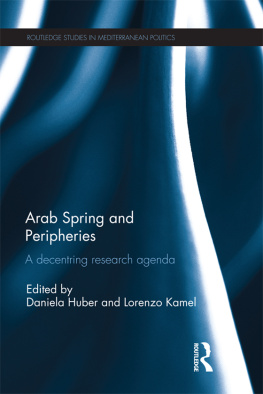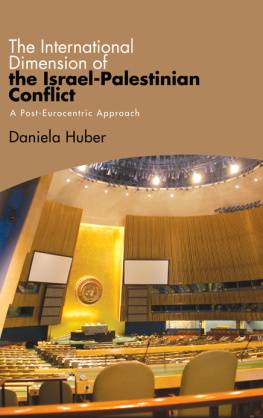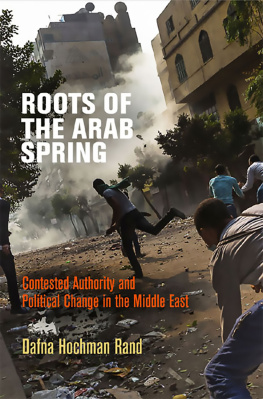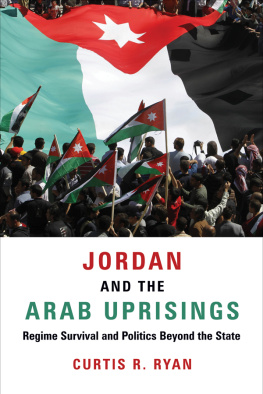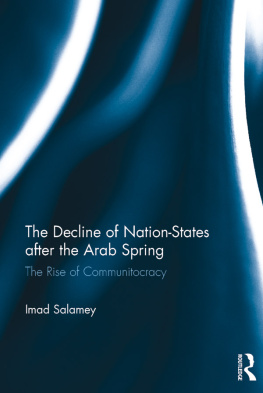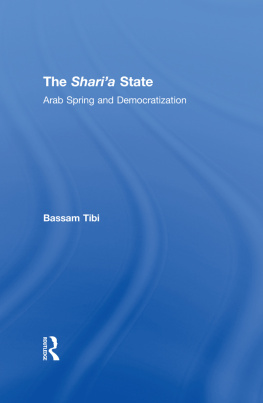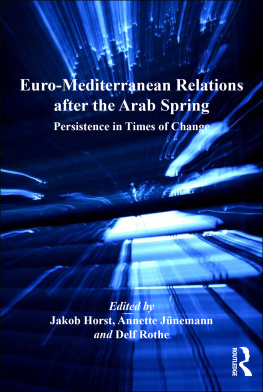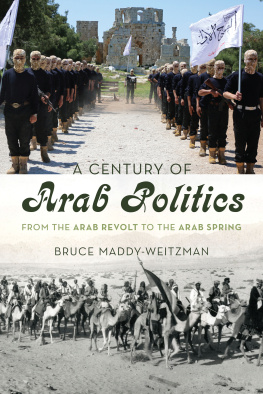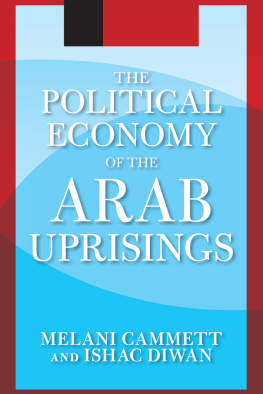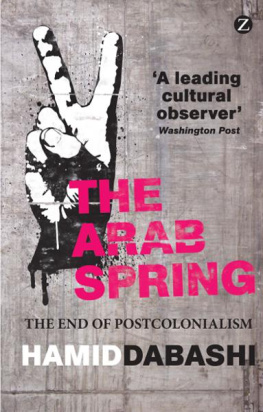Arab Spring and Peripheries
The emerging literature on the so-called Arab Spring has largely focused on the evolution of the uprisings in cities and power centres. In order to reach a more diversified and inner understanding of the Arab Spring, this book examines how peripheries have reacted and contributed to the historical dynamics at work in the Middle East and North Africa. It rejects the idea that the Arab Spring is a unitary process and shows that it consists of diverse Springs that differed in terms of opportunity structure, the strategies of a variety of actors and outcomes. This book looks at geographical, religious, gender and ethnic peripheries, conceptualizing periphery as a dynamic structure that can expand and contract. It shows that the seeds for changing the face of politics and polities are within peripheries themselves. Focusing on the voices of peripheries can therefore be a powerful tool to de-simplify the reading of the Arab Spring and to reshape the paradigmatic schemes through which to look at this part of the world. This book was published as a special issue of Mediterranean Politics.
Daniela Huber is a senior fellow at the Instituto Affari Internazionali (IAI) in the Mediterranean and Middle East programme and a Gerda Henkel Guest Researcher at LUISS University. She holds a PhD from the Hebrew University of Jerusalem and an MA degree in International Relations from the Free University of Berlin. Her research interests include EU and US foreign policies in the Middle East, the regional and international dimension of the Israel/Palestine conflict, and contemporary politics in the Middle East. She has worked for the Friedrich Ebert Foundation in Tel Aviv and Berlin and as a Carlo Schmid Fellow at the United Nations in Copenhagen.
Lorenzo Kamel is a Marie Curie fellow at the Freiburg Institute for Advanced Studies (FRIAS) and a senior fellow at the Istituto Affari Internazionali (IAI). He holds a two-years MA in Israeli Society and Politics from the Hebrew University of Jerusalem, a PhD in History from Bologna University, and was a postdoctoral fellow at Harvard Universitys CMES. His publications include about thirty academic articles on journals such as the British Journal of Middle Eastern Studies, Mediterranean Politics, Eurasian Studies, and 4 authored books, including Imperial Perceptions of Palestine: British Influence and Power in Late Ottoman Times (I.B. Tauris 2015).
Routledge Studies in Mediterranean Politics
Series Editor: Frdric Volpi, University of St Andrews, Scotland
The Mediterranean Politics series takes an inter-disciplinary approach which, while generally focused on the disciplines of politics and international relations, also encompasses economics, human geography, sociology and religious studies, in order to shed light on the interconnectedness of polities and societies in the Mediterranean region. The series takes the study of Mediterranean politics as a focal point to examine the global and transnational linkages between the Mediterranean area and the wider world. Showcasing cutting edge new research on regional, transnational and comparative politics, it provides a forum for the discussion of Mediterranean politics with special reference to the interaction between European and Middle Eastern and North African countries.
The Struggle for Influence in the Middle East
The Arab Uprisings and Foreign Assistance
Federica Bicchi
Twenty Years of Euro-Mediterranean Relations
Richard Youngs
Civil Society and Political Reform in Lebanon and Libya
Transition and constraint
Carmen Geha
Arab Spring and Peripheries
A Decentring Research Agenda
Daniela Huber
Dynamics of Transformation, Elite Change and New Social Mobilization
Egypt, Libya, Tunisia and Yemen
Heiko Wimmen and Muriel Asseburg
EU Neighbourhood Policy in the Maghreb
Implementing the ENP in Tunisia and Morocco before and after the Arab Uprisings
Iole Fontana
Arab Spring and Peripheries
A decentring research agenda
Edited by
Daniela Huber and Lorenzo Kamel
First published 2016
by Routledge
2 Park Square, Milton Park, Abingdon, Oxon, OX14 4RN, UK
and by Routledge
711 Third Avenue, New York, NY 10017, USA
Routledge is an imprint of the Taylor & Francis Group, an informa business
Chapters 14 and 69 2016 Taylor & Francis
Chapter 5 Sylvia I. Bergh & Daniele Rossi-Doria
All rights reserved. No part of this book may be reprinted or reproduced or utilised in any form or by any electronic, mechanical, or other means, now known or hereafter invented, including photocopying and recording, or in any information storage or retrieval system, without permission in writing from the publishers.
Trademark notice: Product or corporate names may be trademarks or registered trademarks, and are used only for identification and explanation without intent to infringe.
British Library Cataloguing in Publication Data
A catalogue record for this book is available from the British Library
ISBN 13: 978-1-138-99966-4
Typeset in Times
by diacriTech, Chennai
Publishers Note
The publisher accepts responsibility for any inconsistencies that may have arisen during the conversion of this book from journal articles to book chapters, namely the possible inclusion of journal terminology.
Disclaimer
Every effort has been made to contact copyright holders for their permission to reprint material in this book. The publishers would be grateful to hear from any copyright holder who is not here acknowledged and will undertake to rectify any errors or omissions in future editions of this book.
Contents
| Daniela Huber and Lorenzo Kamel |
| Edwige A. Fortier |
| Maryam Khalid |
| Mark Farha and Salma Mousa |
| Sylvia I. Bergh and Daniele Rossi-Doria |
| ngela Surez Collado |
| Irene Fernndez-Molina |
| Khaled Elghamry |
| Lorenzo Kamel and Daniela Huber |
The chapters in this book were originally published in Mediterranean Politics, volume 20, issue 2 (July 2015). When citing this material, please use the original page numbering for each article, as follows:
Arab Spring: The Role of the Peripheries
Daniela Huber and Lorenzo Kamel
Mediterranean Politics, volume 20, issue 2 (July 2015) pp. 127141
Transition and Marginalization: Locating Spaces for Discursive Contestation in Post-Revolution Tunisia
Edwige A. Fortier
Mediterranean Politics, volume 20, issue 2 (July 2015) pp. 142160
The Peripheries of Gender and Sexuality in the Arab Spring
Maryam Khalid
Mediterranean Politics, volume 20, issue 2 (July 2015) pp. 161177
Secular Autocracy vs. Sectarian Democracy? Weighing Reasons for Christian Support for Regime Transition in Syria and Egypt
Mark Farha and Salma Mousa
Mediterranean Politics, volume 20, issue 2 (July 2015) pp. 178197
Plus a Change? Observing the Dynamics of Moroccos Arab Spring in the High Atlas
Sylvia I. Bergh and Daniele Rossi-Doria
Mediterranean Politics, volume 20, issue 2 (July 2015) pp. 198216
Territorial Stress in Morocco: From Democratic to Autonomist Demands in Popular Protests in the Rif

